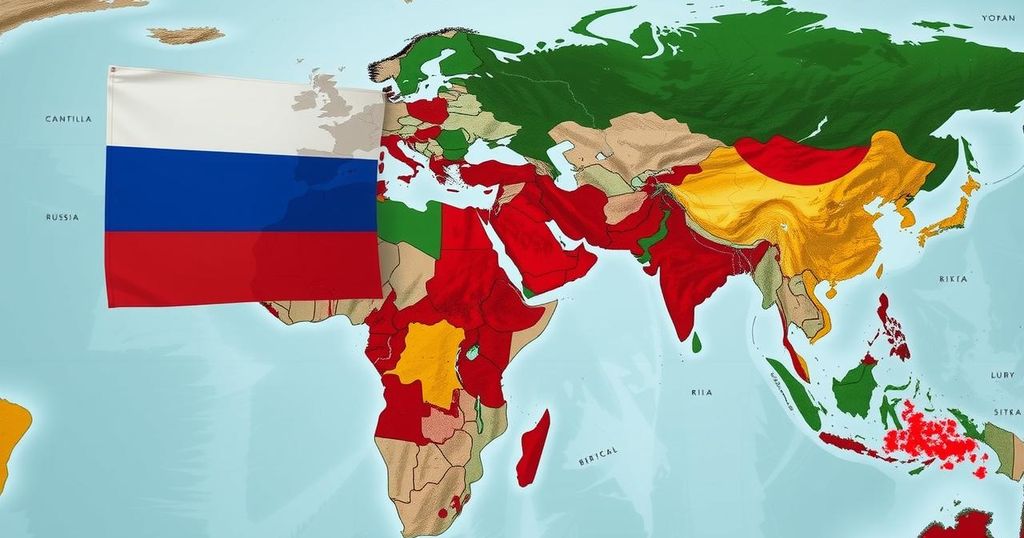Russia Looks to Sudan and Libya as Alternatives to Syrian Naval Base Loss
Russia is facing potential loss of its key military base in Tartus, Syria, as rebel forces gain power. This loss could hinder its ambitions for Africa and the Mediterranean. As a result, Russia is exploring alternative bases in conflict-affected Sudan and Libya, leveraging longstanding ties established by the Wagner Group. The complexities of these geopolitical environments pose both opportunities and challenges for Russian military strategy.
The recent developments in Syria signal a potential setback for Russia’s military strategy, particularly concerning its naval base in Tartus. As Syrian rebels strengthen their control, the Kremlin faces losing its foothold on the Mediterranean, which has been pivotal for projecting power not just in the Middle East but also in Africa. The naval base, coupled with the airfield at Khmeimim, has served as essential assets for Russia, allowing it to influence key maritime corridors and assert its presence against NATO’s southern flank.
In response to these shifts, Russia appears to be looking toward alternative locations for military operations, particularly in war-torn Sudan and the politically fragmented Libya. This pivot is underscored by Russia’s historical involvement in both nations, particularly through the Wagner Group, which has established security relationships in Africa in exchange for resources such as gold and mineral concessions. Tunisia, Libya, and Egypt’s political upheavals beginning in 2011 have provided Russia a pretext to assert military influence across Africa and the Mediterranean.
The Kremlin’s interest in Sudan has reportedly intensified, with discussions about establishing a navy base near Port Sudan to facilitate maritime operations. Despite the ongoing civil conflict in Sudan, where the Russian-backed Rapid Support Forces are in contention with the Sudanese Armed Forces, Moscow is careful to position itself where it can secure benefits regardless of the outcome. The Wagner Group’s previous mining agreements have become crucial revenue sources, further increasing Russia’s stakes in the volatile region.
Simultaneously, Libya’s complex political landscape offers Russia leverage to exploit its oil reserves strategically. The Wagner Group has played a significant role in supporting General Khalifa Haftar during Libya’s civil war. Currently, the rebranded Africa Corps focuses on establishing a substantial military presence in Libya, signifying a commitment to maintain operational options in the Mediterranean even if Tartus is lost.
Ultimately, while Sudan and Libya present viable alternatives to replace Tartus as a key naval base, Russia grapples with challenges such as the need for formal agreements and facilities in these nations to replicate its previous operational capabilities. Moreover, the political backlash towards establishing new military bases could hinder Russia’s aspirations in either country, complicating its efforts to assure continued regional influence.
The article examines the implications of the potential loss of Russia’s naval base in Tartus, Syria, as Syrian rebels reclaim power following a lengthy civil conflict. It contextualizes Russia’s military presence in Syria as a pillar of its strategy to reassert influence in the Middle East and Africa, especially regarding naval operations in the Mediterranean. The piece further discusses the role of the Wagner Group in Africa and the ongoing conflicts in Sudan and Libya, as well as potential shifts in Russia’s military focus to these war-torn regions.
In conclusion, Russia’s diminishing control over its Syrian naval base signals significant repercussions for its regional ambitions, pushing it to consider new operational bases in conflict-ridden Sudan and Libya. While both locations present opportunities, the complexities of local politics and military logistics pose formidable challenges. Russia’s past engagements through entities like the Wagner Group highlight its desire to maintain influence over strategic maritime routes, yet the effectiveness of such moves remains contingent on overcoming existing political and operational obstacles.
Original Source: www.intellinews.com




Post Comment